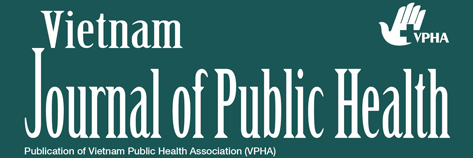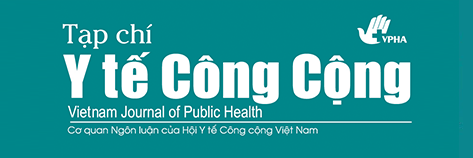Vai trò của cán bộ lãnh đạo địa phương trong một Can thiệp cộng đồng nhằm tăng cường áp dụng kiến thức vào thực hành chăm sóc sức khoẻ trẻ sơ sinh (NeoKIP) tại Quảng Ninh, 2008-2011 (Exploring the roles of local authorities in the Neonatal Health - Knowledge into Practice (NeoKIP) trial in Quang Ninh during 2008 – 2011)
Tóm tắt
Đặt vấn đề: Sử dụng cán bộ hỗ trợ và các ban Chăm sóc sức khỏe Bà mẹ - Trẻ sơ sinh (CSSKBM-TSS), một can thiệp thử nghiệm tăng cường áp dụng kiến thức vào thực hành chăm sóc sức khoẻ trẻ sơ sinh (NeoKIP) đã được triển khai thành công ở Quảng Ninh. Việc nhân rộng và lồng ghép mô hình can thiệp này vào hệ thống y tế có thể giúp tăng cường công tác CSSKBM-TSS ở Việt Nam. Mục tiêu nghiên cứu: Nghiên cứu này tìm hiểu về vai trò của cán bộ lãnh đạo địa phương đến quá trình triển khai dự án NeoKIP. Đối tượng và Phương pháp nghiên cứu: Đây là một nghiên cứu định tính sử dụng phương pháp Quy nạp phân tích trên 16 thảo luận nhóm với các thành viên ban CSSKBM-TSS và cán bộ hỗ trợ dự án. Kết quả: Vai trò tham gia trực tiếp và điều phối của cán bộ lãnh đạo địa phương trong thành công của ban CSSKBM-TSS là rất cần thiết. Sự tham gia tích cực của cán bộ lãnh đạo giúp các ban thực hiện được các hoạt động của mình. Kết luận: Nghiên cứu này đã chứng minh được một yếu tố có tác động quan trọng đến thành công của một can thiệp tăng cường thực hành CSSKBM-TSS là vai trò của cán bộ lãnh đạo địa phương. Chúng tôi khuyến nghị trong tương lai cần tăng cường sự tham gia trực tiếp của cán bộ lãnh đạo địa phương trong can thiệp nhằm tăng cường áp dụng kiến thức vào thực hành chăm sóc sức khoẻ BM-TSS. Các nghiên cứu đánh giá về yếu tố khác về môi trường làm việc tác động đến kết quả can thiệp tương tự cũng rất cần được triển khai.
English abstract:
Background: Using local maternal-and-newborn health groups, supported by facilitators, promoted knowledge translation (KT) in a community-based trial, Neonatal Health-Knowledge into Practice (NeoKIP) resulted in decreasing neonatal mortality in Vietnam. To scale-up this model, there is a need to further understand what factors and how they influenced the facilitation process of the NeoKIP intervention. Objectives: To explore the role of local authorities to facilitation process in the NeoKIP intervention. Materials and Method: A secondary content analysis was performed on 16 Focus Group Discussions (FGDs) with facilitators and participants of the NeoKIP intervention, applying an inductive approach to the manifest content on context. Result: The vital role as direct support and coordination of local authorities to the success of facilitation process were highlighted. This role of local authorities in a KT intervention such as NeoKIP was unique to support the NeoKIP implementation. Conclusion: This study provides insight for further understanding of the roles of local authorities to improve effects of a KT intervention in Vietnam. We suggest future KT interventions should apply strategies to improve local authorities’ direct engagement. Further studies to evaluate other environment or setting aspects influencing KT interventions are also needed in Vietnam.
Từ khóa
Toàn văn:
PDF (English)##submission.citations##
Agency for Health Research and Quality (2001). Translating research into practice (TRIP)-II, Washington, DC.
Azad, K., S. Barnett, B. Banerjee, S. Shaha, K. Khan, A. R. Rego, S. Barua, D. Flatman, C. Pagel, A. Prost, M. Ellis and A. Costello (2010). "Effect of scaling up women's groups on birth outcomes in three rural districts in Bangladesh: a cluster-randomised controlled trial." Lancet 375(9721): 1193-1202.
Bhutta, Z. A., G. L. Darmstadt, B. S. Hasan and R. A. Haws (2005). "Community-based interventions for improving perinatal and neonatal health outcomes in developing countries: a review of the evidence." Pediatrics 115(2 Suppl): 519-617.
Elo, S. and H. Kyngas (2008). "The qualitative content analysis process." J Adv Nurs 62(1): 107-115.
Eriksson, L. (2012). Knowledge Translation in Vietnam : Evaluating facilitation as a tool for improved neonatal health and survival, Acta Universitatis Upsaliensis.
Eriksson, L., D. Duc, A. Eldh, V. P. Thanh, T. Huy, M. Malqvist and L. Wallin (2013). "Lessons learned from stakeholders in a facilitation intervention targeting neonatal health in Quang Ninh province, Vietnam." BMC Pregnancy Childbirth 13(1): 234.
Flodgren, G., M. P. Eccles, S. Shepperd, A. Scott, E. Parmelli and F. R. Beyer (2011). "An overview of reviews evaluating the effectiveness of financial incentives in changing healthcare professional behaviours and patient outcomes." Cochrane Database Syst Rev(7): Cd009255.
Flodgren, G., E. Parmelli, G. Doumit, M. Gattellari, M. A. O'Brien, J. Grimshaw and M. P. Eccles (2011). "Local opinion leaders: effects on professional practice and health care outcomes." Cochrane Database Syst Rev(8): CD000125.
General Statistic Office of Vietnam (2013). Statistical Yearbook of Vietnam 2013. Hanoi, Vietnam Statistical Publishing House.
Graneheim, U. H. and B. Lundman (2004). "Qualitative content analysis in nursing research: concepts, procedures and measures to achieve trustworthiness." Nurse Educ Today 24(2): 105-112.
GSO (2003). Vietnam Demographic and Health Survey 2002. Hanoi.
Manandhar, D. S., D. Osrin, B. P. Shrestha, N. Mesko, J. Morrison, K. M. Tumbahangphe, S. Tamang, S. Thapa, D. Shrestha, B. Thapa, J. R. Shrestha, A. Wade, J. Borghi, H. Standing, M. Manandhar and A. M. Costello (2004). "Effect of a participatory intervention with women's groups on birth outcomes in Nepal: cluster-randomised controlled trial." Lancet 364(9438): 970-979.
Marston, C., A. Renedo, C. R. McGowan and A. Portela (2013). "Effects of Community Participation on Improving Uptake of Skilled Care for Maternal and Newborn Health: A Systematic Review." PLoS ONE 8(2): e55012.
Mason, E. (2005). "Child survival: time to match commitments with action." Lancet 365(9467): 1286-1288.
Nyamtema, A. S., D. P. Urassa and J. van Roosmalen (2011). "Maternal health interventions in resource limited countries: a systematic review of packages, impacts and factors for change." BMC Pregnancy Childbirth 11: 30.
Persson, L. Å., N. T. Nga, M. Målqvist, D. Thi Phuong Hoa, L. Eriksson, L. Wallin, K. Selling, T. Q. Huy, D. M. Duc, T. V. Tiep, V. Thi Thu Thuy and U. Ewald (2013). "Effect of Facilitation of Local Maternal-and-Newborn Stakeholder Groups on Neonatal Mortality: Cluster-Randomized Controlled Trial." PLoS Med 10(5): e1001445.
Prost, A., T. Colbourn, N. Seward, K. Azad, A. Coomarasamy, A. Copas, T. A. Houweling, E. Fottrell, A. Kuddus, S. Lewycka, C. MacArthur, D. Manandhar, J. Morrison, C. Mwansambo, N. Nair, B. Nambiar, D. Osrin, C. Pagel, T. Phiri, A. M. Pulkki-Brannstrom, M. Rosato, J. Skordis-Worrall, N. Saville, N. S. More, B. Shrestha, P. Tripathy, A. Wilson and A. Costello (2013). "Women's groups practising participatory learning and action to improve maternal and newborn health in low-resource settings: a systematic review and meta-analysis." Lancet 381(9879): 1736-1746.
Siddiqi, K., J. Newell and M. Robinson (2005). "Getting evidence into practice: what works in developing countries?" International Journal for Quality in Health Care 17(5): 447-454.
Thomson O'Brien, M. A., A. D. Oxman, R. B. Haynes, D. A. Davis, N. Freemantle and E. L. Harvey (2000). "Local opinion leaders: effects on professional practice and health care outcomes." Cochrane Database Syst Rev(2): CD000125.
United Nations Inter-agency Group for Child Mortality Estimation (2013). Levels and trends in child mortality: Report 2013. New York: USA, UNICEF.



